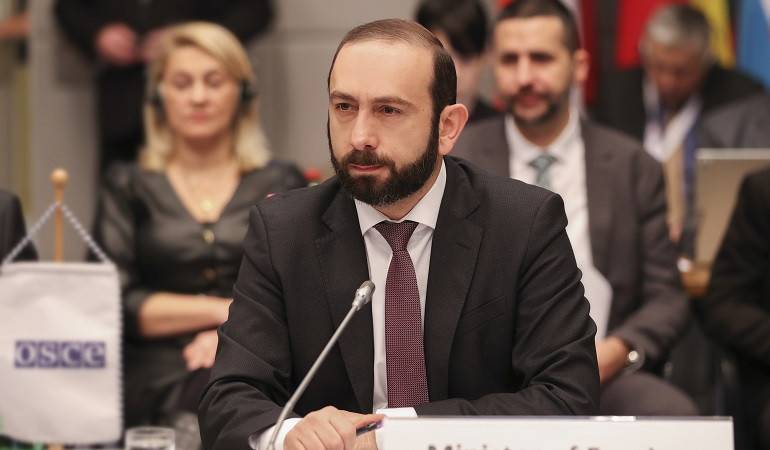The interview of Foreign Minister of Armenia Ararat Mirzoyan to "Armenpress" news agency
20 January, 2023Question: What are the developments in terms of the normalisation process of Armenia-Azerbaijan relations? According to some opinions, the process is in a stalemate.
Answer: Armenia has never stopped the negotiations on the peace treaty with Azerbaijan. Regardless of the Azerbaijani illegal actions in the Lachin Corridor and the delay of the Moscow meeting, we conveyed our new proposals and their rationale for the draft agreement to the Azerbaijani side more than a month ago, but we have not yet received a response. So the ball is now in Azerbaijan's court.
As previously, Armenia is taking a constructive and good faith approach to the negotiation process, as our ultimate goal is to establish security and peace in the region. We also heed to the calls of the international community and are ready to negotiate with greater intensity.
Question: Including the opening of the Lachin Corridor?
Answer: We have repeatedly stated that Paragraph 6 of the November 9 Trilateral Statement, which regulates issues regarding the Lachin Corridor, does not contemplate any function of Armenia to ensure the unimpeded operation of the corridor. Ensuring the normal operation of the corridor is the responsibility of Azerbaijan and the peacekeeping contingent of the Russian Federation. And the issues regarding the internal life of Nagorno-Karabakh are under the jurisdiction of the authorities of Nagorno-Karabakh, and the authorities of the Republic of Armenia have no function here either.
I would also like to add that the humanitarian crisis in Nagorno-Karabakh resulting from the blockade of the Lachin Corridor is already turning into a humanitarian catastrophe and if the corridor is not unblocked immediately, then the humanitarian intervention of the international community, including, first of all, the United Nations is of extreme urgency.
Question: Recently, Azerbaijan has begun to justify the blockade of the Lachin Corridor with the alleged transportation of ammunition, particularly military mines, from Armenia to Nagorno-Karabakh. During his press conference, Minister of Foreign Affairs of Russia Sergey Lavrov declared that they are investigating the information on that issue provided by the Azerbaijani side.
Answer: I would like to note that the Azerbaijani side seems to be confused in its discourse about the blockade of the Lachin Corridor. Azerbaijan often insists that the corridor is not blocked, then says that the corridor is blocked for environmental reasons, and when it was announced that the exploitation of the mine in question had ceased, people claiming to be “eco-activists” demanded inspections of Red Cross vehicles and humanitarian cargo passing through the corridor. Then, they broke into the vehicle that was transporting children back home to Nagorno-Karabakh accompanied by Russian peacekeepers and subjected them to psychological terror. Now, these actions are justified by the fictitious transfer of military mines.
I would like to emphasise once again that the Republic of Armenia carried out minelaying works only within the sovereign territory of the Republic of Armenia and purely for self-defence purposes, as it had faced military aggression by Azerbaijan in May 2021, November 2021 and September 2022. The threat of new military aggression against the sovereign territory of the Republic of Armenia still remains high.
The military mines that the Azerbaijani side displays for propaganda purposes and declares that they were manufactured in 2021 and recently transported from Armenia to Nagorno-Karabakh through the Lachin Corridor, actually were taken by Azerbaijan from the occupied territory of Armenia as a result of the Azerbaijani aggression against the Republic of Armenia in 2021-2022.
Question: There is another controversy on the situation around the Lachin Corridor: the authorities of Azerbaijan declare that the corridor is open, and the authorities of Armenia and Nagorno-Karabakh declare that the corridor is blocked. This may confuse the international community.
Answer: This is also why we propose sending a fact-finding mission of the UN or the OSCE or any other international organisation to the Lachin Corridor and will keep promoting this offer.
Question: President of Azerbaijan Ilham Aliyev announced that Yerevan rejected the proposal of establishing Armenia-Georgia-Azerbaijan trilateral format. How would you comment on this?
Answer: Armenia is greatly interested in the development of trilateral dialogue between the countries of the South Caucasus. We consider the possible platform of Tbilisi from the perspective of regional trilateral discussions, rather than Armenia-Azerbaijan bilateral meetings. Now there is an idea of a meeting between the Prime Ministers of Armenia and Georgia and the President of Azerbaijan.
The Armenian side has expressed willingness and is currently ready for such a meeting, but you must admit that such a meeting does not seem to be particularly efficient and promising when even a simple joint statement expressing commitment to the elimination of hate speech and hostility cannot be agreed on.
Question: What can you say about the process of opening regional communications? Recently, the Minister of Foreign Affairs of Turkey also expressed hope that Armenia will be engaged in the East-West regional mechanisms, cooperating with Kazakhstan, Uzbekistan, Azerbaijan, Turkey and Georgia.
Answer: Armenia is definitely interested both in the full unblocking of transport and economic infrastructure in the region, in accordance with the principles stipulated in the Trilateral Statements of November 9, 2020, and January 11, 2021, and also in being part of larger transport projects. You are probably aware that the "Armenian Intersection" project was put forward by the Government of Armenia, which combines North-South and East-West mechanisms.
Our proposals for the opening of regional communications are still standing and we can implement them at any time, within the framework of the sovereignty and jurisdiction of the countries over the transport routes and the observance of national legislation. In essence, the only and main obstacle here is the groundless demand of Azerbaijan for the extraterritorial corridor.


